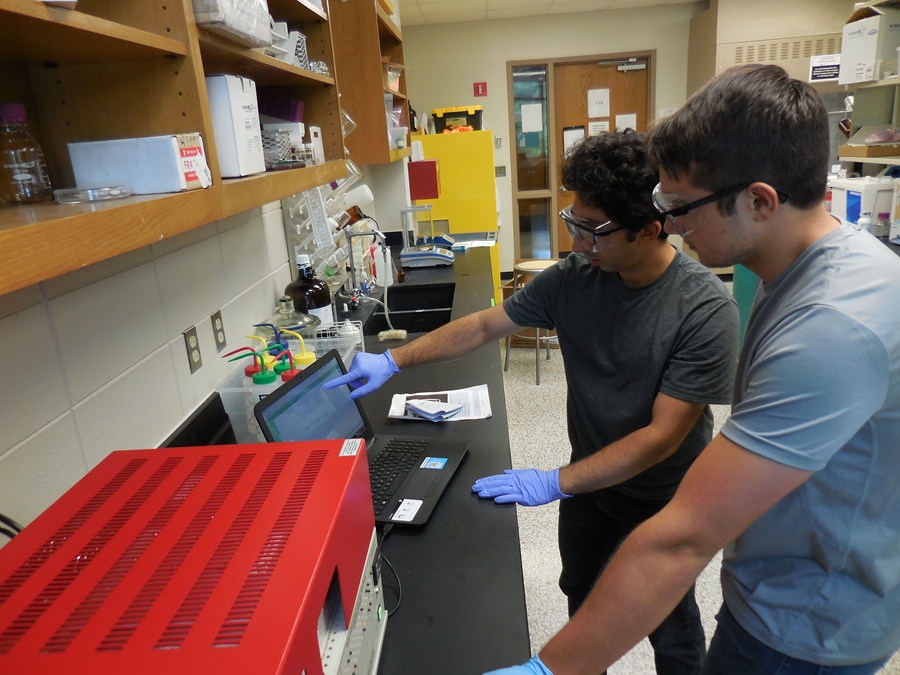
FAYETTEVILLE, Ark. – The Honors College has awarded almost $80,000 in grants to faculty across campus to promote undergraduate research and honors student researchers working in a broad range of disciplines, from animal science to anthropology and biomedical engineering. Grant monies will be used to purchase materials ranging from three-dimensional imaging technology to a virtual anthropology workstation that will allow student researchers to analyze skeletal shapes.
"In large part due to the stellar mentorship of honors professors, our undergraduate researchers are already getting published in top journals," said Jennie Popp, associate dean of the Honors College. "I'm excited to see these grants give students and faculty even better access to the equipment they need to make a transformational difference."
The Faculty Equipment and Technology Grants are funded by a portion of the $300 million gift made by the Walton Family Charitable Support Foundation in 2002. The grants are designed to help clinical, tenured, and tenure-track faculty purchase specialized equipment or technology to support, advance, and promote undergraduate research and honors student researchers at the University of Arkansas.
Faculty who were awarded:
Paul Adams, associate professor, biochemistry: Adams' research will narrow the gap in the knowledge of molecular details of Ras protein, among the first human cancer-causing proteins to be identified.
Kartik Balachandran, assistant professor, biomedical engineering: Balachandran's laboratory investigates the role of mechanical forces on physiology, function and disease. His proposal focused on engineering nanofiber fabrics that have a wide range of applications, ranging from making smart textiles to engineering biological organs.
Ken Coffey, professor, animal science; Jiangchao Zhou, assistant professor, animal science: This animal microbiome research hopes to lead to the identification of probiotics that increase animal growth performance and feed utilization and to more accurate diagnosis and prediction of animal diseases.
Matthew Ganio, associate professor, kinesiology: Ganio's research focuses on improving arterial health using nutritional supplements and heat stress. This research hopes to help provide alternative methods of improving the cardiovascular system and cognition of individuals who are unable to exercise or are older in age.
Betsy Garrison, professor, human environmental science: Researchers are using 3D printer technology in a wide range of applications, from teaching the most basic elementary science principles to practicing surgeries on 3D printed body parts. The application in the apparel field has currently not been as fully explored, which opens up an opportunity for extensive research by young honors students.
David Huitink, assistant professor, mechanical engineering: Huitink's research focuses on enabling high reliability and power density for electronic power modules in electric vehicle drive systems. This will help meet the demands for next generation electric vehicles with applications in transportation, mining and the military.
Morten Jensen, associate professor, biomedical engineering: The purpose of Jensen's Venous Valve Project is to develop an implantable bioprosthetic venous valve to prevent the backflow of blood when it is pumped back up to the heart. Failed venous valves can result in a variety of maladies, ranging from varicose veins to more severe diseases such as Deep Vein Thrombosis.
Doug Rhoads, professor, biological sciences: Rhoads' laboratory works on genetic diseases of broiler chickens, focusing on hypertension and bacterial infections of the bones leading to lameness. Both of these issues impact the economics and animal welfare in the broiler industry.
Mary Savin, associate professor, microbial ecology: Recent discoveries are uncovering microorganisms' fundamental role in determining the status, health and everyday functioning of people, animals and ecosystems. With insight gained from scientific advances, Savin's research will help us further understand the vast diversity of microbial communities with the potential to revolutionize approaches to managing agriculture and human health.
Claire Terhune, assistant professor, anthropology: Skeletal shape has the potential to reveal a myriad of information about the behaviors of and relationships among living humans and our ancient ancestors. This proposal will allow honors students to process and analyze 3D data describing skull, tooth and limb shape across vertebrates, primates and mammals.
Peter Ungar, distinguished professor, anthropology: Research in Ungar's laboratory focuses on using patterns of microscopic use wear on teeth to reconstruct the diets of human ancestors and other fossil mammals. This work allows scientists to identify changes in diet among fossil species that can be associated with changes in local environments and climate in the past. The ultimate goal is to better understand what drove our evolution and that of other animals over the past few million years.
Tyrone Washington, assistant professor, health, human performance, & recreation: Washington's research focuses on cancer cachexia, a disease which accounts for 20 percent of all cancer deaths. A prominent hallmark of cachexia is cardiac muscle wasting (cardiac cachexia). Cardiac cachexia is associated with impaired function of the heart, so treatments to prevent or manage cardiac cachexia will have dramatic impacts on survival and quality of life.
Wenchao Zhou, assistant professor, mechanical engineering: Zhou's mission is to develop next-generation 3D printers and to promote the use of 3D printing technology. The proposal would support development of new 3D printing technologies that reduce printing time, the major component of 3D printing cost, from hours to seconds, so that 3D printing can compete with traditional manufacturing.
Contacts
Anthony Blake, senior editor
Honors College
479-575-2000, ab026@uark.edu
Kendall Curlee, director of communications
Honors College
479-575-2024, kcurlee@uark.edu